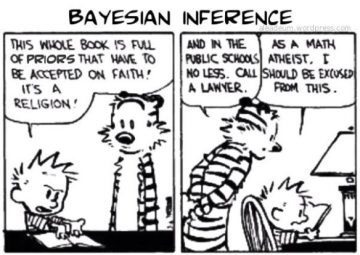The initial choice of a prior probability distribution is not regulated in any way. The probabilities, called subjective or personal probabilities, reflect personal degrees of belief. From a Bayesian philosopher’s point of view, any prior distribution is as good as any other. Of course, from a Bayesian decision maker’s point of view, his own beliefs, as expressed in his prior distribution, may be better than any other beliefs, but Bayesianism provides no means of justifying this position. Bayesian rationality rests in the recipe alone, and the choice of the prior probability distribution is arbitrary as far as the issue of rationality is concerned. Thus, two rational persons with the same goals may adopt prior distributions that are wildly different … Bayesian learning is completely inflexible after the initial choice of probabilities: all beliefs that result from new observations have been fixed in advance. This holds because the new probabilities are just equal to certain old conditional probabilities … According to the Bayesian recipe, the initial choice of a prior probability distribution is arbitrary. But the probability calculus might still rule out some sequences of beliefs and thus prevent complete arbitrariness.
Topics:
Lars Pålsson Syll considers the following as important: Economics
This could be interesting, too:
Lars Pålsson Syll writes Schuldenbremse bye bye
Lars Pålsson Syll writes What’s wrong with economics — a primer
Lars Pålsson Syll writes Krigskeynesianismens återkomst
Lars Pålsson Syll writes Finding Eigenvalues and Eigenvectors (student stuff)
The initial choice of a prior probability distribution is not regulated in any way. The probabilities, called subjective or personal probabilities, reflect personal degrees of belief. From a Bayesian philosopher’s point of view, any prior distribution is as good as any other. Of course, from a Bayesian decision maker’s point of view, his own beliefs, as expressed in his prior distribution, may be better than any other beliefs, but Bayesianism provides no means of justifying this position. Bayesian rationality rests in the recipe alone, and the choice of the prior probability distribution is arbitrary as far as the issue of rationality is concerned. Thus, two rational persons with the same goals may adopt prior distributions that are wildly different …
Bayesian learning is completely inflexible after the initial choice of probabilities: all beliefs that result from new observations have been fixed in advance. This holds because the new probabilities are just equal to certain old conditional probabilities …
According to the Bayesian recipe, the initial choice of a prior probability distribution is arbitrary. But the probability calculus might still rule out some sequences of beliefs and thus prevent complete arbitrariness.
Actually, however, this is not the case: nothing is ruled out by the probability calculus …
Thus, anything goes … By adopting a suitable prior probability distribution, we can fix the consequences of any observations for our beliefs in any way we want. This result, which will be referred to as the anything-goes theorem, holds for arbitrarily complicated cases and any number of observations. It implies, among other consequences, that two rational persons with the same goals and experiences can, in all eternity, differ arbitrarily in their beliefs about future events …
From a Bayesian point of view, any beliefs and, consequently, any decisions are as rational or irrational as any other, no matter what our goals and experiences are. Bayesian rationality is just a probabilistic version of irrationalism. Bayesians might say that somebody is rational only if he actually rationalizes his actions in the Bayesian way. However, given that such a rationalization always exists, it seems a bit pedantic to insist that a decision maker should actually provide it.
Nice to see that the son of Hans Albert is keeping critical rationalism alive …

